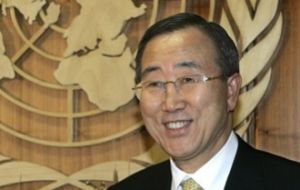MercoPress. South Atlantic News Agency
UN urges C 24 decolonization advance process
 UN Secretary General Ban Ki-moon
UN Secretary General Ban Ki-moon All over the world, hundreds of millions of people had exercised their right to self-determination and achieved self-government, and facilitating that process was “one of the proudest chapters of our Organization's history” Secretary-General Ban Ki-moon said last week as he opened the current session of the Special Committee on decolonisation, the so called C24 (according to official UN reports).
The Secretary General said that that chapter was still being written and until the status of the 16 remaining Non-Self Governing Territories was satisfactorily resolved, the ideals of the General Assembly Declaration on Decolonisation would continue to be unfulfilled. The Falkland Islands and Gibraltar are among the 16 listed territories. As the end of the Second International Decade for the Eradication of Colonialism approached, he looked to the Committee to advance the process. In his opening remarks, C24 Chairperson Marty Natalegawa (Indonesia) said decolonisation historically had been among the most challenging mandates of the United Nations. Indeed, since the Organization's founding, nearly 750 million people had exercised their right to self-determination, and more than 80 once-colonized Territories had gained independence. Despite those achievements he said decolonisation remained "unfinished business", and he urged members to seek effective ways to accelerate that process, particularly in resolving questions of "permanent" international political status in accordance with General Assembly resolutions. There was an urgent need to establish a compelling basis for the global community's approach to decolonizing the territories that would directly involve all concerned. "We need to approach each case with an open mind," and build on available options to bring about a results-oriented evolution of positions for moving forward, he said. Progress required considering each Territory on a case-by-case basis, and he urged members to make genuine efforts to address the concerns –- even passions -– of all relevant stakeholders: the global community, administering powers and the people of the Non-Self-Governing Territories, said the chairman. "I applaud your stress on productive cooperation between the Special Committee and the administering Powers, while always bearing in mind the interests of the Territories. And I appeal to all parties to engage in a transparent and creative dialogue to ensure that the views of the peoples of the remaining Territories are heard," he told the C24. The representative of Dominica stressed that, with only two years remaining until the end of the International Decade, the Committee must stimulate the decolonization process. Thus far, its review had been insufficient, and it was left wanting for analysis on the ground, particularly in small island Territories. He urged taking steps to implement the case-by-case work plan, and encouraged Members to be forward looking in developing indicators of success. "The clock is ticking," he said. On territories that were the subject of sovereignty disputes, he said debate would intensify in the coming year, and he was concerned that such discussion would take attention away from small island territories Supporting that idea, the representative of Saint Lucia also focused on the fact that most administrating Powers had discontinued their cooperation on the decolonisation issue, and the extent of information and analysis in the Territories was not enough for States to offer real solutions to move the process forward. Development of the case-by-case work plan had been "effectively stalled", and unless implementation efforts were intensified, progress would be elusive.




Top Comments
Disclaimer & comment rulesCommenting for this story is now closed.
If you have a Facebook account, become a fan and comment on our Facebook Page!